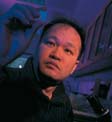 The
mouse that roared "We couldn't have made that diagnosis without Bob," recalls Schmidt, an associate professor of pediatrics at Harvard Medical School. "I'm sitting here at Harvard Medical School with thousands of pathologists I can consult with, and I went to him. He is the best person in the world in the area of analyzing breast cancer pathology. Period." Cardiff is so good at his specialty that when Schmidt put together a grant proposal involving, he says, "most of the Harvard Cancer Center investigators," he insisted Cardiff be included. A former chair of the Department of Pathology and Department of Medical Informatics, Cardiff is happiest when sharing information. In 1994 he established a Web site (http://www-mp.ucdavis.edu/tgmice/firststop.html) that has a comprehensive relational database of all transgenic mice that Cardiff and his peers have studied, including tumors and the transgenes that produced them. It boasts a bibliography and abstracts of published transgenic mouse research papers and an atlas of normal mouse mammary development. It also helps Cardiff collaborate with researchers all over the world. With site access and a password, investigators can e-mail digital color slides of transgenic mice directly to Cardiff for downloading, or request a pathology report electronically. His own research is focused on mouse breast cancer using the virus gene polyoma middle-T as a model. Polyoma middle-T acts similarly to the human oncogene HER2 in mouse breast cancer by promoting its growth and metastasis. Cardiff and investigators with the UC Davis Cancer Center have joined with researchers at UC San Diego in studying mice missing the polyoma gene. By studying what triggers polyoma middle-T in mice, investigators hope to get important clues about what stimulates HER2 in women with metastatic breast cancer. Cardiff is also assisting Shen on a study of the oncogene gene, Nkx, a protein missing in men with prostate cancer. "The gene is expressed in the embryo and appears to affect how the prostate develops," says Cardiff. "Right now, it's only guilty by association. To test it we have to put it into a multi-organ system." That system would be the mouse, and the pathologist would be Cardiff. Says Schmidt, "Bob is unique in that he's interested in cancer both from the point of view of treatment and its consequences and the science behind cancer." "And besides," Schmidt adds, "He's fun to work with."
Home |
Table of Contents |
To our Readers |
Building on Basics UC Davis Health System | © 2000, 2001, 2002 UC Regents. All rights reserved. |
Jae-Hak Park, a visiting professor from Seoul University, examines a blood sample from a human prostate gland. |

